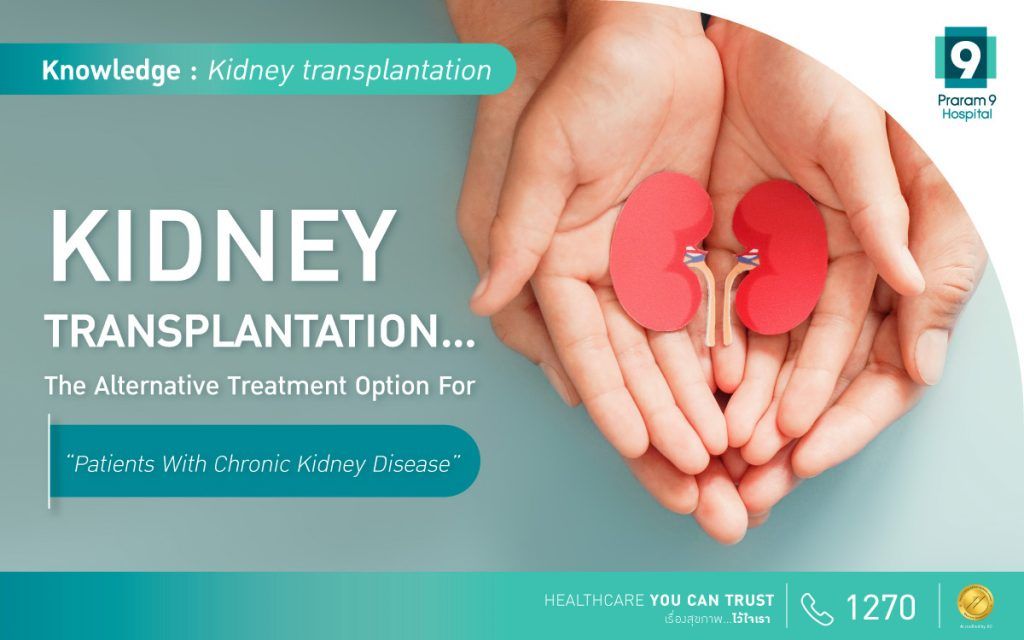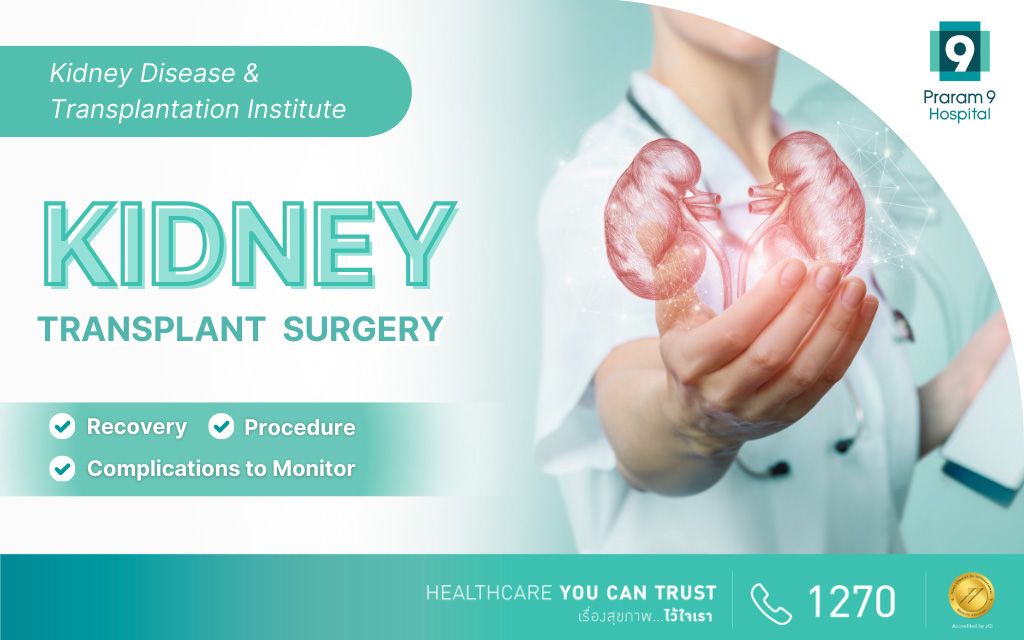Health Articles
Knowledge
Kidney transplantation: The alternative treatment option for patients with chronic kidney disease.
WISIT LIWLOMPAISAN,M.D., SUTHANIT LAOWALERT, M.D.

The kidney is an important organ in the body because it is responsible for eliminating excess water and waste from the body. Therefore, if there is chronic kidney disease, it can lead to a buildup of waste in the body. This condition should be diagnosed and treated properly as leaving it untreated can lead to other serious complications.
Patients with chronic kidney disease usually undergo dialysis with a kidney machine or peritoneal dialysis to remove waste from the body. However, nowadays the best treatment for chronic kidney disease is through kidney transplantation, with a success rate of up to 95-98% for living donors and up to 85-90% for brain dead donors. After the transplant, patients can have a better quality of life and return to their normal daily activities.
The kidneys are essential organs that play a crucial role in eliminating excess water and waste products from the body. Therefore, chronic kidney disease can lead to the accumulation of toxic substances in the body, which can cause severe complications if left untreated. As such, it is essential to diagnose and manage chronic kidney disease appropriately to prevent further complications.
Patients with chronic kidney disease typically undergo hemodialysis or peritoneal dialysis to remove waste products from their bodies. However, kidney transplantation is currently the most effective treatment for end-stage renal disease. With a success rate of up to 95-98% for living donor transplants and up to 85-90% for deceased donor transplants, kidney transplantation offers a high chance of restoring a patient’s quality of life.
In conclusion, managing chronic kidney disease effectively is crucial to prevent the buildup of toxic substances in the body and avoid further complications. Kidney transplantation is currently the most effective treatment for end-stage renal disease, offering patients a high chance of regaining a good quality of life.
Functions and Importance of the Kidneys
The kidney is an organ located in the retroperitoneal space (an area in the body located behind the lining of the abdominal cavity) in the lower back. There are two kidneys, each about the size of a fist. The main function of the kidney is to excrete excess water and waste products generated by various organs out of the body through urine. In addition to its primary role in waste elimination, the kidney also performs other functions, including regulating the body’s water and mineral balance, controlling the acidity of the body, controlling blood pressure, maintaining vitamin D and calcium balance, and bone production. It produces erythropoietin hormone which stimulates the production of red blood cells, and regulates the activity of other hormones, such as the renin-angiotensin-aldosterone system and prostaglandin, which affect blood pressure regulation and inflammation in the body.
Symptoms of Chronic Kidney Disease
Chronic kidney disease refers to a condition in which the functioning of the kidneys is impaired, leading to the accumulation of water and waste products within the body. This condition can have an impact on various bodily systems and is considered a crisis that requires treatment to prevent the buildup of harmful substances in the body. Symptoms of renal failure include swelling, high blood pressure, weakness, fatigue, bone pain, fragile bones, and fractures, impotence, muscle weakness, tremors, and convulsions, itching, anemia, coarse and dry skin, and bleeding. Other symptoms may include loss of appetite, nausea, vomiting, diarrhea, bloody vomiting, and bloody stool. Heart failure, irregular heartbeat, shortness of breath, and pulmonary edema can also occur. Severe cases may lead to brain dysfunction, coma, or death. Children with renal failure may experience growth retardation.
Treatment options for chronic kidney disease patients.
Currently, there are three treatment options available for patients with chronic kidney disease:
- Hemodialysis: This involves using a dialysis machine to filter waste products from the patient’s blood. Blood is removed from the patient, passed through the machine, and then returned to the patient’s body once it has been cleaned.
- Continuous ambulatory peritoneal dialysis (CAPD): This involves using a solution to flush waste products from the patient’s body through a catheter that has been placed in their abdomen. The solution is left in the abdomen for several hours before being drained out. This process is repeated several times a day, including during the night.
- Kidney transplantation: This is the most effective treatment for chronic kidney disease. It involves transplanting a kidney from a living donor or from a deceased donor with brain death who still has a functioning kidney. Patients who receive a kidney transplant have a better chance of living longer and having a better quality of life. They can resume normal activities and live a relatively normal life.
What is kidney transplantation?
Kidney transplantation is a surgical procedure that involves replacing a kidney by taking a kidney from a donor, who may be a living donor such as a parent, sibling, or blood relative, or a deceased donor who has suffered brain death. In the case of chronic kidney disease patients, they must register with the National Organ Transplantation Foundation in Thailand to receive a donated kidney.
Surgical options for kidney transplantation
Kidney transplantation can be performed using a kidney from a living donor, known as living-related kidney transplant, who is typically a relative, such as a parent, sibling, child, grandchild, uncle, aunt, or spouse, and in some cases, a friend or unrelated donor who meets legal requirements. In this procedure, the donor typically donates one kidney, as the remaining kidney is sufficient to maintain normal body functions.
Alternatively, a kidney can be obtained from a deceased donor, known as deceased donor kidney transplant, who has suffered brain death due to accidents or other causes. This option is considered when living related donors are not available or are not suitable for transplantation. In Thailand, the Thai Red Cross Organ Donation Center is responsible for receiving and allocating deceased donor kidneys to chronic kidney disease patients.
Advantages and Disadvantages of Kidney Transplantation
Kidney transplantation is the most effective treatment for chronic kidney disease, but it also has some limitations that require careful planning and coordination between the medical team and the patient to ensure maximum benefit and safety for the patient with chronic kidney disease.
Advantages:
- If the transplanted kidney functions well, it can replace the original kidney almost completely.
- The quality of life can be restored almost to normal.
- The patient does not have to control food and water intake as strictly as with other treatment methods.
- Sexual function may improve, and the patient may be able to have children.
Disadvantages:
- It is a major surgical procedure and carries the risks associated with surgery.
- The patient must take immunosuppressant drugs for life, which can have side effects such as increased risk of infection, diabetes, high blood lipid levels, and high blood pressure.
- There is a risk of rejection of the transplanted kidney by the patient’s immune system.
- There is a need for a kidney donor.
- The patient must be prepared for the transplantation procedure.
The characteristics of a kidney transplant recipient are as follows:
The individual is in the end-stage of chronic kidney disease, with a kidney function of less than 15%. In the case of receiving a kidney from a brain-dead patient, the recipient must receive treatment for end-stage kidney disease through hemodialysis using a dialysis machine or peritoneal dialysis using a solution.
The individual does not have any infections, is not HIV-positive, and does not have any liver diseases that preclude kidney transplantation. Additionally, if the individual has had cancer, they must have been in remission for at least 2-5 years depending on the type of cancer.
The individual does not have any high-risk surgical conditions, such as coronary artery disease or heart failure. They also do not have any abnormalities in blood clotting, mental health conditions, or substance abuse disorders.
In order to transplant kidneys, they must be from a genetically related family member or a patient with brain death. Thailand has clear and strict laws and guidelines regarding organ transplantation to prevent organ trafficking, and doctors and patients who violate them will be severely punished. Donated kidneys must come from living donors who are genetically related to the recipient, including parents, siblings, and children from the same biological mother or father, uncles, aunts, nephews, nieces, or cousins with the same genetic relationship. Donors must also be legal spouses or partners who have disclosed their status and lived together for at least three years. In cases where there are children from the same biological parents, no waiting period is required. DNA can be used to confirm relatedness. For foreign nationals, documents confirming the relationship or marital status must be certified by the appropriate authorities of their country of origin, and the authenticity of the documents must be confirmed by the Ministry of Foreign Affairs.
Preparation before kidney transplantation
Preparing for kidney transplantation involves extensive preparation for both the recipient and the donor, especially since kidney transplantation is considered a major surgery. Donors must undergo a series of medical and psychological tests, including blood typing, physical and mental evaluations, and compatibility checks, to determine their suitability to donate a kidney. They must also receive detailed explanations from medical professionals about the donation process and prepare themselves mentally and physically for the procedure.
Recipients who are waiting to receive a kidney from a deceased donor must maintain good health and follow strict guidelines to ensure they are prepared for the transplant surgery if a suitable kidney becomes available. Hospitals such as Phramongkutklao Hospital have policies in place to provide support and reassurance for both donors and recipients, including exchanging experiences between previous donors and recipients to increase confidence and understanding of the transplantation process.
Preparation for donors and recipients
Kidney Donors
The kidney transplantation involves having a surgical procedure to remove the kidney, followed by a 5-7 day hospital stay for aftercare, then returning home for rest and recuperation before coming back to the hospital for a kidney check-up at a later date as arranged by the doctor after donating.
For kidney recipients from relatives or spouses
Admit to the hospital for at least 1 day before the kidney transplant surgery to undergo physical examination and prepare for the surgery.
For kidney recipients from brain-dead patients
.
After being informed by the hospital that they are eligible for a kidney transplant surgery, the patient should do the following:
- Refrain from eating or drinking anything
- Take a shower and immediately travel to the hospital
- Undergo physical and mental examinations to prepare for the kidney transplant surgery.”
Post-transplant measures
While at the hospital, after undergoing a kidney transplant, the patient will receive close care from the medical team and must stay in the hospital for about 2-4 weeks. The following care and treatments will be provided:
- Management of pain after surgery
- Physical rehabilitation by encouraging exercise in the first week after surgery
- The doctor will check the functioning of the new kidney at regular intervals after surgery
- Adjustment of emotional changes and follow-up by a team of psychiatrists
- Monitoring for post-surgery complications such as rejection of the new kidney or infections
- After leaving the hospital, the patient will need to take immunosuppressant drugs, regularly visit their doctor, maintain good hygiene, and avoid contact with people who have infectious diseases to prevent infection.
Food and Nutrition after Kidney Transplantation
Patients after kidney transplantation should choose appropriate foods, as follows:
Carbohydrate Group Foods
- Consume rice, bread, and sugar in appropriate amounts.
- Choose complex carbohydrates, such as brown rice, hand-milled rice, and oatmeal.
- Avoid high-sugar foods, such as sweetened drinks, fruit juice, and sweets.
- Choose foods with a low glycemic index (< 55), such as oatmeal, hand-milled rice, and barley.
Fat Group Foods
- Consume lean meats or meats with low fat content, such as fish, chicken breast, and egg whites.Avoid fried foods, pastries, and high-cholesterol foods.
- Avoid or limit alcohol consumption.
- Reduce consumption of late-night meals.
- Consume meals on a regular schedule to ensure efficient metabolism.
Protein Group Foods
- Choose high-quality proteins, such as milk, lean meats, fish, and egg whites.
- Consume sufficient protein to repair the body after surgery.
Sodium-containing Foods
- Limit the amount of sodium in food to reduce kidney workload.
- Avoid processed, pickled, canned, and frozen foods.
- Avoid seasoning powders, flavor enhancers, and bouillon cubes in food.
- Reduce the consumption of dipping and dressing sauces.
Daily life after kidney transplantation
Exercise:
- In the first week after kidney transplantation, it is recommended to stand and walk around the bed.
- 2-4 weeks after kidney transplantation, you should walk around the house 3-4 times a day for 15 minutes each time.
- 2-4 weeks after kidney transplantation, you should walk fast until you sweat for 15-30 minutes, 1-2 times a day.
- After 6 weeks of kidney transplantation, you can exercise as usual, including suitable sports such as aerobic dance, ping pong, running, and swimming.
- You should avoid contact sports such as boxing, judo, wrestling, rugby, football, and other sports that involve collisions.
Alcohol consumption:
- You can drink alcohol, but it is recommended to limit the amount.
- You should not drink close to the time of taking immunosuppressive drugs because it can affect kidney function.
Sexual activity:
- You can have sex as usual, but it is recommended to have safe sex.
- If you have sexual dysfunction, you should consult a doctor.
Having children:
Women who have had a kidney transplant should wait 2 years before getting pregnant. Pregnancy should be under close medical supervision.
How many years can a person live after kidney transplantation?
According to statistics from the Thai Association of Organ Transplantation in the year 2017, it was found that up to 78.2% of patients who received kidney transplants can live for up to 10 years. This means that out of 100 patients, 78 patients can live for more than 10 years after the transplant surgery. This shows that the success rate of kidney transplant surgery is relatively high nowadays. However, the length of survival after kidney transplant surgery depends on various factors such as the health condition of each patient and how well they take care of themselves.
Repeated Kidney Transplant Surgery
In some cases, it may be necessary to undergo a repeat kidney transplant surgery, such as when the previously transplanted kidney deteriorates, there is a chronic disease that affects the transplanted kidney, or there is a gradual rejection of the kidney, kidney sloughing, or certain types of infections. When the doctor determines that a repeat kidney transplant surgery is necessary, the procedure is similar to the first transplant surgery, and the new kidney may be donated by a relative or waiting for a donation from the Thai Red Cross Society. Patients undergoing a repeat kidney transplant may receive more immunosuppressive drugs than they did during their first transplant to prevent rejection and protect the new kidney. The decision to perform a repeat transplant surgery depends on the discretion of the doctor.
Kidney transplantation at Praram 9 Hospital
For the past 30 years since the opening of Praram 9 Hospital(June 1992 – Feb 2023), the Kidney Institute and Transplantation Center has successfully performed 1,180 kidney transplant surgeries. Patients who have received kidney transplants are able to return to a near-normal quality of life. The following statistics are of interest:
- 393 kidneys were donated by relatives of the patients who were blood-related.
- 33 kidneys were donated by legal spouses of the patients.
- 754 kidneys were donated from the Thai Red Cross Organ Donation Center.
- 89 patients received kidney transplants within 1 month.
- 352 patients received kidney transplants within 6 months.
- 509 patients received kidney transplants within 12 months.
- The youngest patient to receive a kidney transplant was 11 years old (received a kidney from their younger brother).
- The oldest patient to receive a kidney transplant was 84 years old (received a kidney from the Thai Red Cross Organ Donation Center).
- 349 patients over the age of 60 received kidney transplants.
- 98 patients underwent repeated kidney transplant surgeries due to previous failed kidney transplants.
- 5 pregnant patients received kidney transplants, and 7 babies were born to mothers who had received kidney transplants.
- The Kidney Institute and Transplantation Center at Ramathibodi Hospital has received the JCI (Joint Commission International, USA) accreditation for excellence in kidney transplantation following international standards in 2016
Summary
Chronic kidney disease is a disease that directly affects the quality of life of patients, especially in the final stage where the kidneys lose almost all their function, making it difficult for patients to perform daily tasks. Treatment options include dialysis using a dialysis machine or using a catheter to flush the blood. Currently, the best treatment option for patients with chronic kidney disease is kidney transplantation, which can be donated by family members, spouses, or from individuals with brain death. However, taking care of the health of the kidneys through exercise, a healthy diet, and regular check-ups is the best way to prevent kidney disease.
















